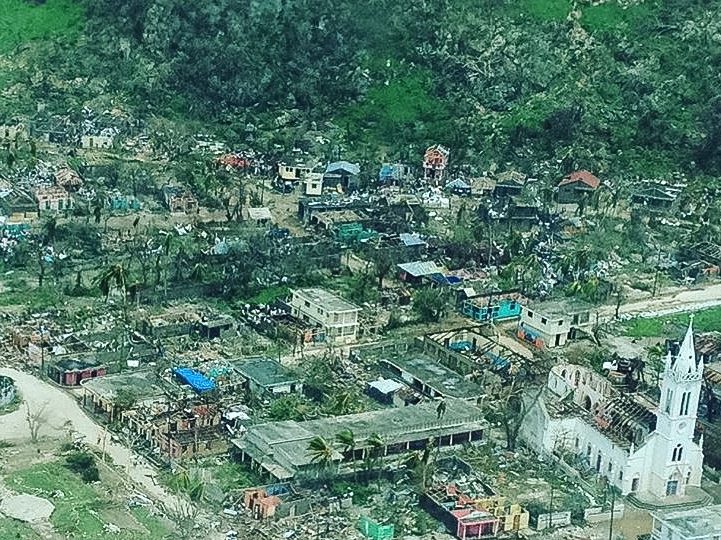Update: Hurricane Matthew in Haiti

Hurricane Matthew, one of the worst Atlantic hurricanes in recent history, made landfall in Haiti on Tuesday, October 4 with sustained wind speeds of 120 mph and a prediction of between 25 and 40 inches of rainfall.
It has already claimed the lives of hundreds of people, and it is likely that this number will continue to grow as more people find their way to the most affected areas.
Moving slowly, Matthew hammered shanties and battered institutions of this vulnerable nation for a dozen hours, dealing its most lethal blows to the southern and western parts of the island, resulting in what the United Nations called the worst humanitarian crisis since the devastating earthquake six years ago. Trees were uprooted, crops and livestock destroyed, water supplies affected, communications disrupted.
Areas that are difficult to access under the best of conditions were cut off as bridges were ripped out – most significantly for the devastated west, the bridge at Petit-Goâve, which carries Route Nationale 2 – the only main road linking western Haiti with Port-au-Prince.
Early reports have documented major damage to the towns of Jérémie and Les Cayes. Homes, churches, and other structures were destroyed as the storm swept away the few possessions of the vulnerable, impoverished residents. The United Nations estimated that 2.3 million people were living in areas impacted by the hurricane, including 17,000 pregnant women three months or fewer from their due dates.
The populations in the areas where CMMB works – that is, in Sud-Est department at the Gris-Gris clinic (near Côtes-de-Fer) and in Grande-Anse department clinic (in Dame-Marie), Olivier clinic (near Petit-Goâve), and the Gébeau clinic – received the full force of the storm and are in major need of emergency response supplies and support.
The same is true in Port-au-Prince, where CMMB has a strong presence in the vast Cité Soleil slum, where heavy rain and storm surges combined with poor construction of makeshift shanty homes to produce serious damage. Sewage canals overflowed and filled the streets with garbage and human waste, and the canvas tents where many people have been living since the January 2010 earthquake were completely inadequate to provide shelter from a hurricane of Matthew’s power.
In all damaged areas, throughout Haiti, families are without homes, clothing, food, and water. In addition, the potential for cholera is worrying; Côtes-de-Fer has only recently recovered from a summer outbreak and cholera is still present in Port-au-Prince.
We plan to facilitate clean water provision for approximately 10,000 people most severely affected by the hurricane for a period of three months. This includes water purification sachets, sensitization on proper use, a supply of buckets to the households that need them, targeting exercises within the community, community‐based distribution and follow-up monitoring and reporting.

Our Bishop Joseph Sullivan Health Center in Côtes-de-Fer is providing a safe place for the most vulnerable.
THE CMMB RESPONSE: OVERVIEW OF TOP PRIORITIES
1: Water purification kits(including tablets, powders, and filters) are urgently neededto ensure safe drinking water.
2: Emergency food supplies are needed to replace those demolished in the storm and compensate for the disruption of the normal agricultural calendar and destruction of local markets.
3: Essential non-food items are needed to provide shelter; also needed are basic household items such as buckets, so that insofar as is possible and where possible, families can return to normal domestic routines.
4: Essential medicines are needed to help residents avoid infection from wounds sustained during the storm and the cleanup and in communities to prevent outbreaks of diseases such as cholera.
Our team is on the ground in Côtes‐de‐Fer as well as in our head office in Port‐au‐Prince. The response to this past summer’s cholera outbreak have ensured that the CO is well prepared with systems and processes to mount a rapid emergency response. Under the leadership of CMMB Haiti Country Director Dr. Dianne Jean‐François, Program Director Syndie Saint‐Hilaire will lead the day‐to-day management of our response.
Your support saves lives. Please consider making a donation to our disaster relief efforts today.
